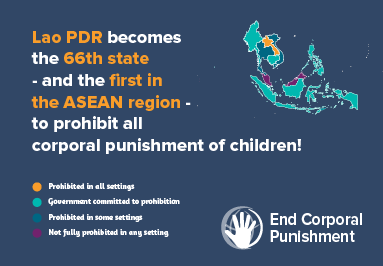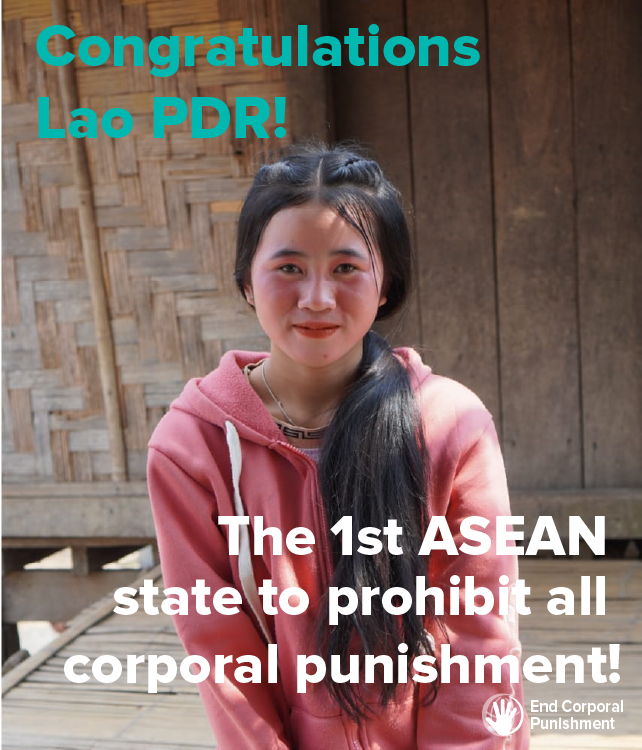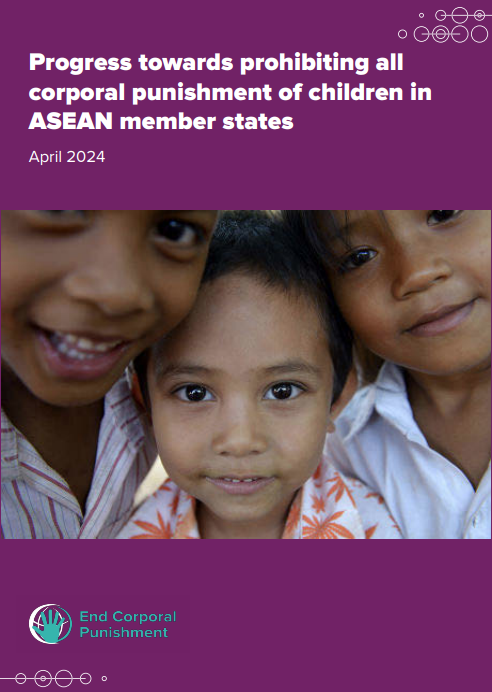Lao People’s Democratic Republic prohibits all corporal punishment of children!
Lao PDR has achieved full prohibition of corporal punishment of children with the enactment of the Law on the Protection of the Rights and Interests of Children 2006 (Amended 2023). The new Law was promulgated by Presidential Decree in August 2023. It came into force in December 2023, and was officially announced by the Government on 30 April 2024, the International Day to #EndCorporalPunishment.
With this law reform, Lao PDR becomes the 66th state worldwide, and the first ASEAN state to realise children’s rights to protection from all violent punishment.

Article 57 (2) of the Law on the Protection of the Rights and Interests of Children 2006 (Amended 2023) states (unofficial translation): “Parents, guardians, and other persons are prohibited from the following behaviors […] Physical abuse by corporal punishment, beating, scolding, and other forms of torture of children…”
The new Law also confirms the prohibition of corporal punishment in schools as follows (unofficial translation): “A child-friendly school is a typical school with an environment that is appropriate and promotes learning and study…where [children are] protected from the use of violence, physical punishment, corporal [punishment] or inappropriate words or acts that affect [their] dignity…” (article 21)
Children physically abused are defined as “children who have been physically beaten, corporally punished, or tortured by their parents, guardians, or other persons” (articIe 3) (unofficial translation).
In its article 80, the Law also includes sanctions in case of violation. Individuals, legal entities or organizations that contravene the law may be “re-educated, warned, disciplined, fined, compensated for civil damages, or criminally punished according to the laws”.
The new Law on the Protection of the Rights and Interests of Children 2006 (Amended 2023) was adopted in replacement of the previous Law on the Protection of the Rights and Interests of Children 2006 which did not explicitly prohibit corporal punishment. The law reform process started in 2022 and was led by the Ministry of Justice, in collaboration with other government agencies and child rights stakeholders including UNICEF.
As an ASEAN Member State, Lao PDR is committed to implementing Action 3.22 of the ASEAN Regional Plan of Action for the Elimination of Violence Against Children 2016-2025 which requires all ASEAN Member States to prohibit corporal punishment of children in all settings. The Government therefore developed its second Five-year National Plan of Action for Prevention and Elimination of Violence Against Children (2021 – 2025) which subsequently led to the adoption of this new Law.
The enactment of the Law on the Protection of the Rights and Interests of Children 2006 (Amended 2023) reflects the government's priorities in strengthening child protection systems and developing the social service workforce. As well as prohibiting all corporal punishment of children the new Law achieved many other important reforms for children, including the exemption of birth registration fee, the definition of the role and responsibilities of relevant Ministries and government agencies, notably the Committee for the Protection of the Rights and Interests of Children.
We applaud this critical progress for children, and also welcome the positive parenting and other interventions being delivered by the Government and its partners in many provinces to put the law into practice. Together, the prohibition of corporal punishment and its implementation will enable Lao PDR to make significant progress in eliminating all forms of violence against children in whatever context they occur.
With a child population of 2,753,000, prohibition in Lao PDR brings the total number of children worldwide protected by law from corporal punishment to approximately 325 million, or 14% of the global child population.
But many children around the world are still waiting to be protected from legalized violence. Considering the global commitment to ending all violence against children in the context of the 2030 Agenda for Sustainable Development, we call on all remaining governments to enact prohibition as a matter of priority.
Find out more:
- Read our country report for Lao PDR
- Find out how Lao PDR prohibited all corporal punishment, and what it is doing to put the law into practice
- Find out about the ASEAN Regional Plan of Action for the Elimination of Violence Against Children 2016-2025
- Read about progress towards universal prohibition of corporal punishment in the Asia and Pacific region


